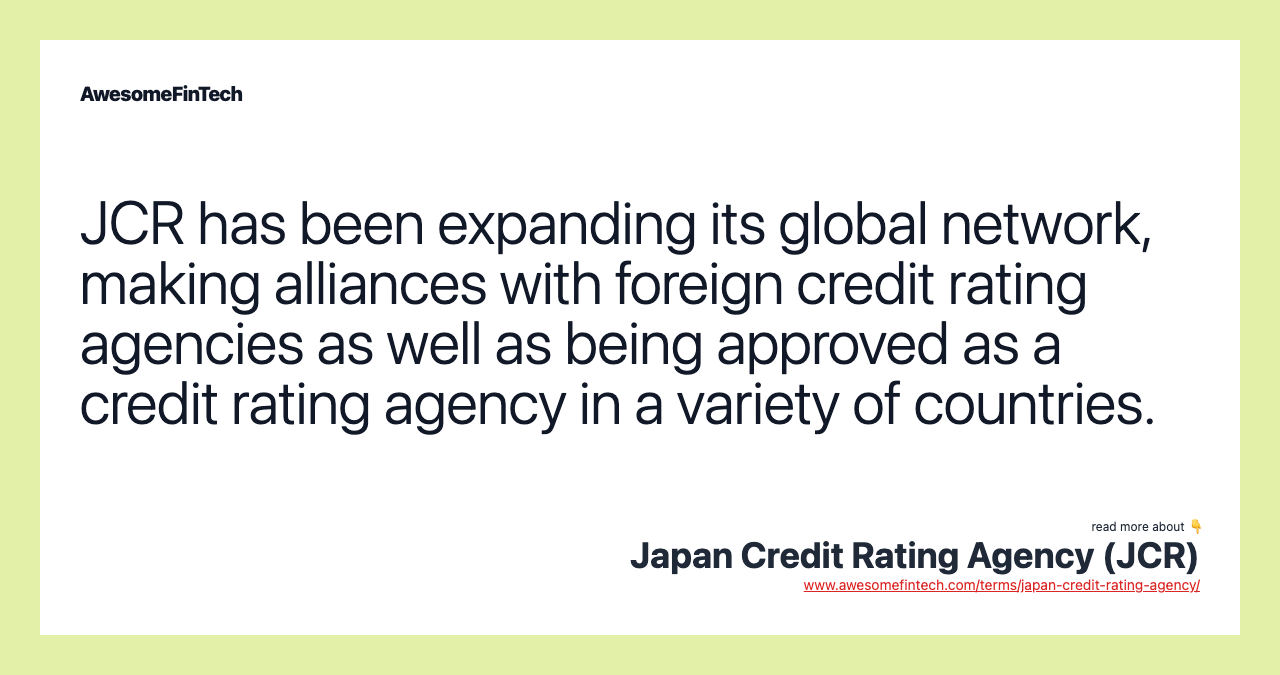Japan Credit Rating Agency (JCR)
The Japan Credit Rating Agency (JCR) is a Japanese financial services company that provides credit ratings on the corporate debt of Japanese companies and foreign bond issuers. JCR has two rating scales that it uses to rate debt issuances: a long-term rating scale and a short-term rating scale. The Japan Credit Rating Agency (JCR) is Japan's primary credit rating agency, providing ratings on corporate and financial bond issuers in Japan. JCR uses two rating scales; one long term and one short term, with the long-term rating scale functioning similarly to those of S&P's and Moody's. The long-term rating scale is similar to that of the rating scales used by western credit rating agencies, such as S&P and Moody's.

What Is the Japan Credit Rating Agency (JCR)
The Japan Credit Rating Agency (JCR) is a Japanese financial services company that provides credit ratings on the corporate debt of Japanese companies and foreign bond issuers. The entity also publishes a variety of financial and economic information and serves as a guide for counterparty credit risk.







Understanding the Japan Credit Rating Agency (JCR)
The Japan Credit Rating Agency (JCR) is one of Japan’s key bond rating agencies and rates the vast majority of Japanese corporate debt, including asset-backed securities. It provides a number of services, including rating debt securities of all types, as well as publishing financial market, economic, and industry research, and providing data as a service. JCR was founded in April 1985.
The JCR has witnessed many financial crises since it was founded in 1985, including the Japanese real estate bubble, the Asian financial crisis, the 2007-08 financial crisis, the European sovereign debt crisis, and the East Japan Tsunami, and considers itself to be an expert in credit risk analysis.
Responsibilities of the Japan Credit Rating Agency (JCR)
JCR provides rating guidance for over 60% of approximately 1,000 publicly rated issuers in Japan. In addition, JCR provides rating coverage for over 70% of the financial industry in Japan and is also dominant in the medical and educational sectors.
JCR has responded to globalization and bond issuers’ and investors’ demand for international rating agencies. Its ratings are used in major overseas markets like the U.S., Europe, Turkey, Hong Kong, Indonesia, and Thailand, and it has assigned credit ratings for more than 200 foreign issuers. The JCR was officially registered in the U.S. as a Nationally Recognized Statistical Rating Organization in 2007 and was certified in the European Union in 2011.
Some of the additional services that JCR provides for its clients include networking, private credit assessment, credit risk estimation modeling, green and social financial evaluation, seminars and training, economy and industry information, and research and knowledge sharing.
The company also provides details on all of its rating methodologies, detailing its processes and policy on its website. It breaks down its rating methodologies into five different groups, which are corporates, financial institutions, the public sector, structured finance, and sovereigns and supranationals.
Japan Credit Rating Agency (JCR) Rating Scales
JCR has two rating scales that it uses to rate debt issuances: a long-term rating scale and a short-term rating scale. The long-term rating scale is similar to that of the rating scales used by western credit rating agencies, such as S&P and Moody's.
The long-term rating scale ranges from AAA to D, with AAA signifying the highest level of quality and D signifying default. For the rating symbols between AA and B, a plus or minus may be attached to indicate the issuers standing within that rating.
JCR's short-term rating scale ranges from J-1 to J-3, and below that there are two more ratings: NJ and D. D in this instance also indicate default whereas J-1 is the highest level of quality.
Related terms:
A- / A3
A-/A3 are similar rating categories issued by two different rating agencies, Moody's and S&P, to reflect long-term investment bond creditworthiness. read more
Asian Financial Crisis
The Asian financial crisis was a series of currency devaluations and other events that spread through many Asian markets beginning in the summer of 1997. read more
Asset-Backed Security (ABS)
An asset-backed security (ABS) is a debt security collateralized by a pool of assets. read more
Introduction to Bond Rating Agencies
Bond rating agencies are companies that assess the creditworthiness of both debt securities and their issuers. Discover more about them here. read more
Corporate Credit Rating
A corporate credit rating is an opinion of an independent agency regarding the likelihood that a corporation will fully meet its financial obligations. read more
Credit Rating
A credit rating is an assessment of the creditworthiness of a borrower—in general terms or with respect to a particular debt or financial obligation. read more
European Sovereign Debt Crisis
The European debt crisis refers to the struggle faced by Eurozone countries in paying off debts they had accumulated over decades. It began in 2008 and peaked between 2010 and 2012. read more
Moody's
Moody's provides economic analysis software and rates securities based on assessed risk and the borrower's ability to make interest payments. read more
Nationally Recognized Statistical Ratings Organization (NRSRO)
A nationally recognized statistical ratings organization (NRSRO) is a federally recognized organization that provides an assessment of creditworthiness. read more